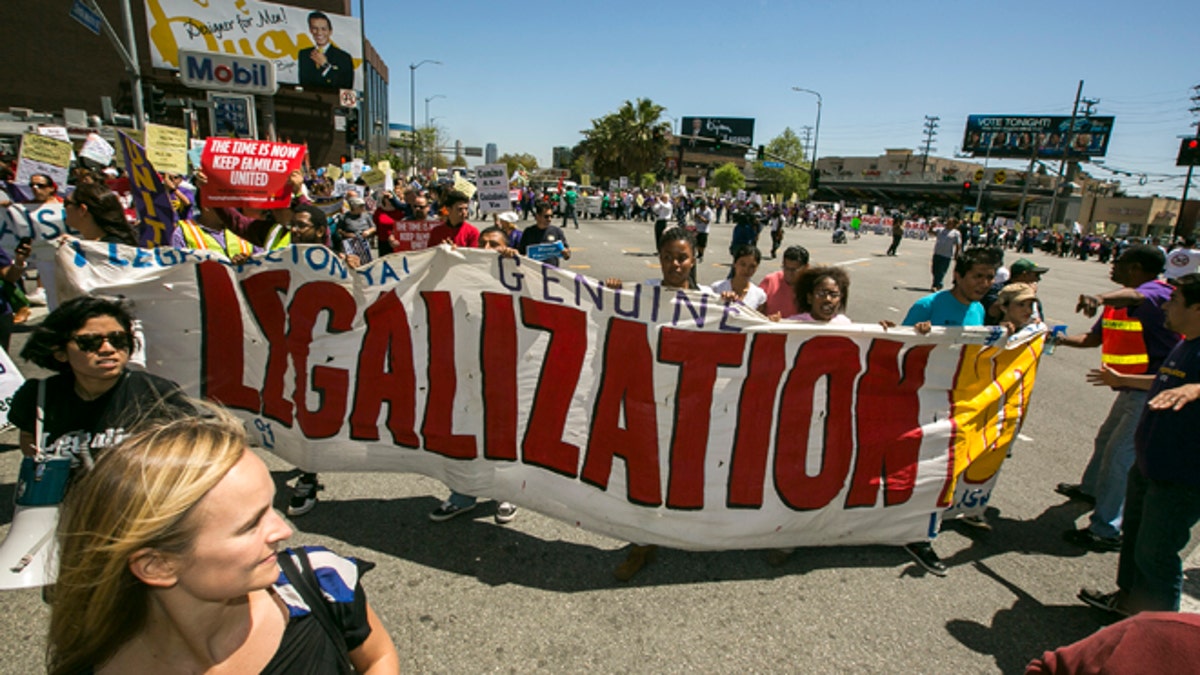
April 10, 2013: Activists rally for immigration reform in Los Angeles. (AP)
While the authors of the newly released Senate immigration bill touted its multibillion dollar investment in border security, critics are seizing on what they describe as a major loophole -- giving the government "discretion" to choose when to enforce immigration laws.
The union representing Immigration and Customs Enforcement agents has long complained that the Obama administration has made their job harder by preventing agents from detaining and deporting select illegal immigrants. They had petitioned members of the so-called "Gang of Eight" -- the lawmakers writing the immigration bill -- to address those concerns in the package.
But, in a letter obtained by FoxNews.com, National ICE Council President Chris Crane said "this legislation again does nothing to resolve that."
The letter was sent Tuesday to Sen. Marco Rubio, R-Fla., a key member of the Gang of Eight, shortly before the legislation was formally released. Crane thanked Rubio for meeting with him, a meeting he had long sought, but complained that the bill did not address his concerns.
"In fact, it appears that the security components it does contain focus mostly on the exterior, and rely on the discretion of DHS, even though DHS is in federal court right now for undermining the constitutional rule of law," Crane wrote, referring to a lawsuit brought by ICE agents.
The proposal, as emphasized by its co-authors, does aim to invest billions in border security -- both for a security and fencing plan. In a bid to ease conservative concerns, the bill establishes a set of "triggers" that would have to be met before illegal immigrants currently in the country can apply for a green card.
Those triggers include steps for the Department of Homeland Security to launch a new border security and fencing plan, and achieve high levels of apprehension along high-risk areas on the Mexican border.
But Crane said the Senate legislation should be held until several major issues are addressed -- including what he described as "directives" that release "dangerous criminal aliens" back into the community and the Obama administration's "dangerous abuse" of prosecutorial discretion.
The administration has allowed "prosecutorial discretion" to let the government focus on deporting high-risk illegal immigrants. Officials have said criminal aliens are generally not being released, and that only low-priority individuals are given a reprieve. The administration also issued a directive allowing some illegal immigrants who came to the U.S. as children to stay.
Critics, though, warn that legalizing the millions of illegal immigrants already in the country without establishing a strict system of interior enforcement will allow the problem to fester all over again.
Sen. Jeff Sessions, R-Ala., who has been one of the Senate's biggest critics of the immigration bill, echoed Crane's concerns.
"Our interior enforcement needs are almost totally neglected in the Gang's proposal," he said in a statement. "Alarmingly, the bill leaves intact the single greatest obstacle to immigration reform: the administration's abuse of prosecutorial discretion to prevent the enforcement of federal law."
Sessions is expected to join with Crane and Sen. David Vitter, R-La., for a press conference on the bill Thursday afternoon.
The bill is scheduled to come up for its first hearing on Friday. Rubio has sided with fellow Republicans in saying the bill should get a thorough review on Capitol Hill.
"Our immigration system is broken, and the status quo of having 11 million undocumented people living under de facto amnesty will only continue if we do nothing to solve this problem. This bill marks the beginning of an important debate," he said.
Rubio described the bill as a "strong conservative effort."
While the path to citizenship and other provisions draw the most scrutiny from congressional Republicans, the nearly 900-page bill contains a number of other measures -- including a new system of temporary visas for low-skill workers and expanded visas for high-skill workers.
The bill, unlike the recently stalled gun control legislation, comes out of the gate with prominent bipartisan backing. Rubio was one of four Republicans drafting the bill, and some other Republicans have expressed a willingness to consider an immigration overhaul, with the goal of leveraging the immigrant workforce to help the economy and cutting red tape.




